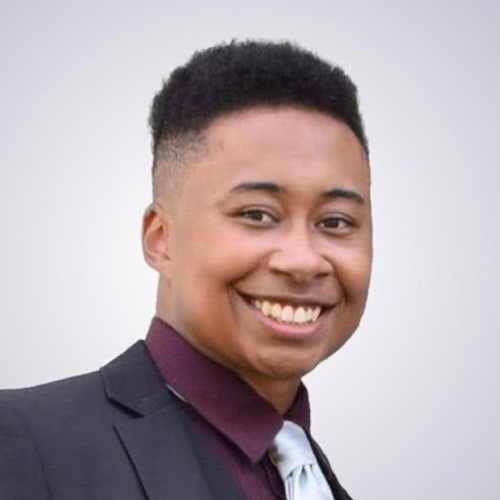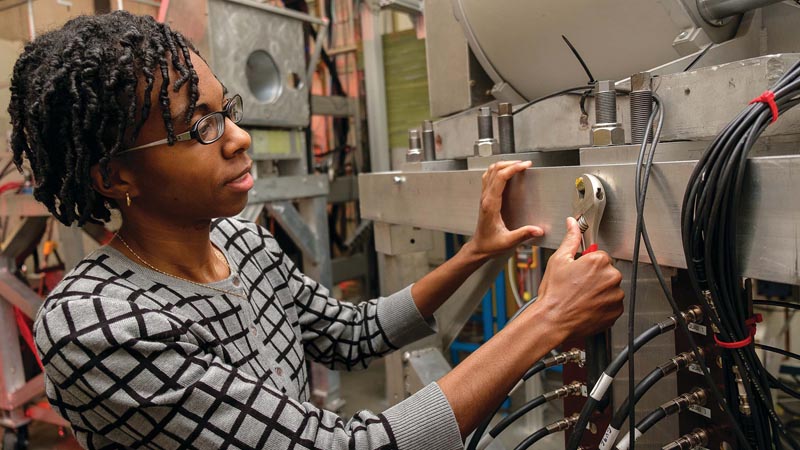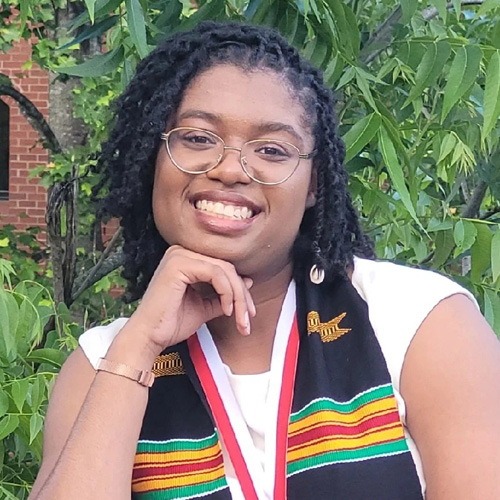 Pryor Gibson is a radiation effect test engineer at Analog Devices, Inc. in the Research Triangle Park, a device semiconductor manufacturing company. He graduated from North Carolina Central University (NCCU) with a bachelor's degree in physics and North Carolina State University with a bachelor's degree in electrical engineering as part of the joint 3+2 partnership program where students earn both a physics degree from NCCU and an engineering degree from NC State. After graduation, Pryor stayed one extra year at NC State to earn a master’s in electrical engineering.
Pryor Gibson is a radiation effect test engineer at Analog Devices, Inc. in the Research Triangle Park, a device semiconductor manufacturing company. He graduated from North Carolina Central University (NCCU) with a bachelor's degree in physics and North Carolina State University with a bachelor's degree in electrical engineering as part of the joint 3+2 partnership program where students earn both a physics degree from NCCU and an engineering degree from NC State. After graduation, Pryor stayed one extra year at NC State to earn a master’s in electrical engineering.
Pryor was a member of the first Cheatham-White scholarship group and partnered with the DREAMSTEM program at NCCU while serving as both a mentor with the University Honors Program and as a teaching assistant. Additionally, he was a member of National Society of Black Engineers and the Drone Team at NCCU.
During his time at NCCU, he interned with the Research Development and Innovation (RDI) initiative within the Department of Mathematics and Physics, Georgia Institute of Technology, AST Technology Labs, and Massachusetts Institute of Technology.
When Pryor began at NC State, coronavirus required students to learn remotely, so Pryor began forming online groups of classmates to facilitate studying. When classes came back to begin in person, he was vice president of the Electrical and Computer Engineering Ambassadors at NC State. This connection helped generate more dialogue between NCCU and NC State to improve the 3+2 program.
Pryor now works at Analog Devices, Inc. in their Aerospace and Defense Group. He tests and characterizes various electronic components on their performance in radioactive environments predominately for space applications. His work is used to assist companies build systems that will make access to space more cost effective in the future using skills he developed from university, especially LabVIEW programming, particle physics, and electronic circuit knowledge.
"So, two 'categories' of advice that I’ll say: technical and then 'personal.' Starting with technical, don’t avoid programming. Students should attend professor’s office hours even if it is to recap what happened in lecture that day. Students should read the textbook chapters the professor references in lecture (in advance if possible). Students can benefit from research or passion projects to help build relevant skills during the school year. As everyone says, work on time management.
As for 'personal' advice, if students allow it, the NCCU Department of Mathematics and Physics can be a community that will desire and actively assist their success. My best advice is to lean into that and allow that to help drive you in your pursuits for community to give you purpose, guidance, and accountability. With that, heed this final piece of advice, which serves as a warning: To have community at this level is unique. I became normalized the sense of community. Once you’re out of university, you are on your own to a larger degree. While having such a strong support network at NCCU, I encourage students to seek out internships or other experiences where they are treated more as a number rather than an individual, to learn how to thrive in any environment.
Take every experience and build upon it. Go be great!"
 Bennett McAuley graduated from NCCU in Fall 2018 with a Bachelor of Science in Mathematics, Mathematics, Computational and Engineering Mathematics (CEMA) concentration, with a focus in Data Science. He is now a diversity, equity, and inclusion (DEI) program manager at SAS, responsible for spearheading the ongoing development of the organization’s Employee Inclusion Group (EIG) program. He also serves as the data and analytics reporting lead for SAS’ DEI efforts, in partnership with the HR People Analytics team. While working full-time, he obtained a Master of Statistics from NC State. His ongoing mission is to merge his technical and analytical knowledge with his passion for helping underrepresented groups thrive in their careers and personal lives.
Bennett McAuley graduated from NCCU in Fall 2018 with a Bachelor of Science in Mathematics, Mathematics, Computational and Engineering Mathematics (CEMA) concentration, with a focus in Data Science. He is now a diversity, equity, and inclusion (DEI) program manager at SAS, responsible for spearheading the ongoing development of the organization’s Employee Inclusion Group (EIG) program. He also serves as the data and analytics reporting lead for SAS’ DEI efforts, in partnership with the HR People Analytics team. While working full-time, he obtained a Master of Statistics from NC State. His ongoing mission is to merge his technical and analytical knowledge with his passion for helping underrepresented groups thrive in their careers and personal lives.
 Maya Clinton is a part of the first cohort to graduate from the 3+2 Dual Degree Physics and Mechanical Engineering program between North Carolina Central University and North Carolina State University. From an early age, Maya wanted to be an engineer, as she wanted to design, build and invent. However, in high school, she fell in love with physics. The 3+2 program allowed her an opportunity to pursue both. A Durham native, NCCU is home to Maya in many ways.
Maya Clinton is a part of the first cohort to graduate from the 3+2 Dual Degree Physics and Mechanical Engineering program between North Carolina Central University and North Carolina State University. From an early age, Maya wanted to be an engineer, as she wanted to design, build and invent. However, in high school, she fell in love with physics. The 3+2 program allowed her an opportunity to pursue both. A Durham native, NCCU is home to Maya in many ways. Pryor Gibson is a radiation effect test engineer at Analog Devices, Inc. in the Research Triangle Park, a device semiconductor manufacturing company. He graduated from North Carolina Central University (NCCU) with a bachelor's degree in physics and North Carolina State University with a bachelor's degree in electrical engineering as part of the joint 3+2 partnership program where students earn both a physics degree from NCCU and an engineering degree from NC State. After graduation, Pryor stayed one extra year at NC State to earn a master’s in electrical engineering.
Pryor Gibson is a radiation effect test engineer at Analog Devices, Inc. in the Research Triangle Park, a device semiconductor manufacturing company. He graduated from North Carolina Central University (NCCU) with a bachelor's degree in physics and North Carolina State University with a bachelor's degree in electrical engineering as part of the joint 3+2 partnership program where students earn both a physics degree from NCCU and an engineering degree from NC State. After graduation, Pryor stayed one extra year at NC State to earn a master’s in electrical engineering.